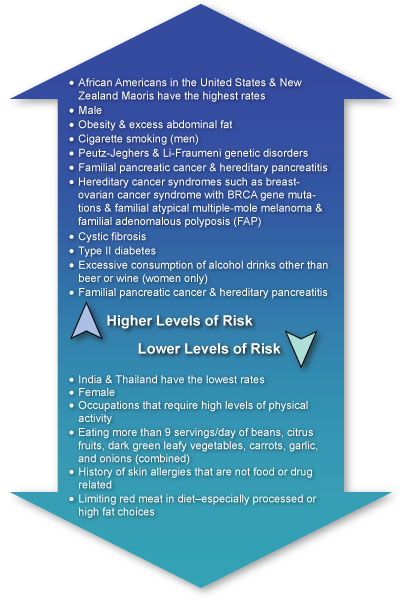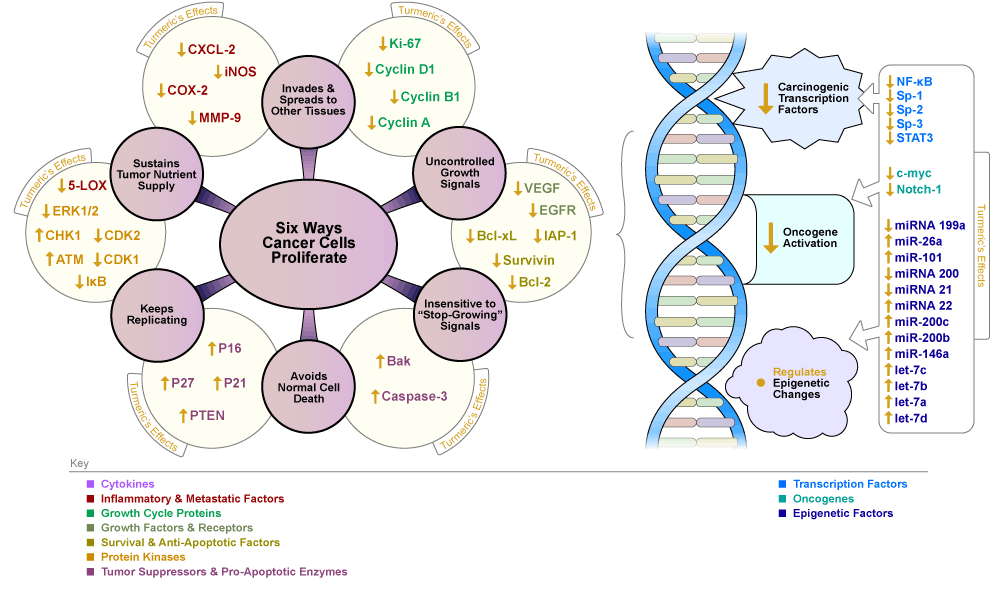Beating Pancreatic Cancer with Turmeric Compounds

Pancreatic cancer is a difficult-to-treat malignancy with poor prognosis. Even though it is the 13th most prevalent cancer worldwide, it is the 8th leading cause of death from the disease. It seldom causes symptoms until it has advanced and metastasized to other organs. Many patients live less than a year after being diagnosed with the disease. (vi.174, 366, 367)
Chemotherapy drugs approved by the U.S. Food and Drug Administration for pancreatic adenocarcinoma have limited benefit beyond reducing pain and weight loss. Clinical trial evidence shows that the rate of tumor response to gemcitabine is typically no more than 10.5%. Combining the 2 approved drugs increases 1-year survival rates from 17% to 23%. But the survival time in patients once the pancreatic cancer starts to grow again averages only 10 weeks. (vi.174, 182, 368)

Pancreatic Cancer Risk Factors
Even slower-growing pancreatic tumors are difficult to treat once they start to progress. Given its high mortality rate and chemoresistance, we need better options for treating pancreatic cancer. Research indicates that prevention and treatment with substances such as curcumin from turmeric may be an important ally in beating pancreatic cancer. (vi.366, 367)
Steve Jobs, the famous founder of Apple®, lived far longer than average in part because he had a much rarer form of the disease with tumors that typically remain stable without progressing. Most patients with pancreatic cancer are diagnosed with pancreatic adenocarcinoma, which is very aggressive. (vi.366-, 367, 379)
Risk Factors for Pancreatic Cancer
Many studies suggest that lifestyle factors play a role in the development of pancreatic cancer. However, age is the most established risk factor, with the chance of developing the disease increasing significantly over
Can Curcumin Be Effective If It Doesn't Stay in the Body Long Enough?
One of the main concerns that cancer researchers have with curcumin as a viable therapy is that it does not seem to stay long enough in the body to exert any benefit beyond the intestinal tract. However, curcumin has demonstrated some success in a clinical trial involving patients with advanced or inoperable pancreatic cancer that is no longer responsive to conventional FDA approved therapies. Researchers who conducted the clinical trial noted that despite the apparent lack of bioavailability, as measured by blood plasma levels of curcumin that were barely detectable, nevertheless curcumin showed beneficial clinical response in about 10% of the patients—including one advanced pancreatic cancer patient who had stable disease for about 2.5 years. This is comparable to the only two FDA-approved chemotherapy drugs used to treat advanced pancreatic cancer—gemcitabine and erlotinib—which benefit less than 10% of patients. (vi.22, 369)
Improved Bioavailability
Promising follow-up on research that engineered curcumin analogues and encapsulated versions of curcumin may further improve upon this response rate, demonstrating increased presence in pancreatic tissue. Researchers at Johns Hopkins University School of Medicine recently published results of pre-clinical lab and animal studies using an injectable form of encapsulated curcumin (NanoCurc) that showed significantly higher and sustained levels of curcumin in both plasma and organs. Additionally, those animals treated with NanoCurc alone and in combination with gemcitabine showed dramatic reductions in tumor growth and elimination of most metastatic lesions. (vi.24, 48, 225)
Other researchers at the University of South Dakota have developed a magnetic nanoparticle loaded with curcumin. When tested on mice with pancreatic tumors, it increased their survival by suppressing tumor growth. This formulation enhanced curcumin bioavailability, with a significant amount of the turmeric compound reaching the pancreatic tumors. (vi.370)
In an animal study, the combination of fish oil and curcumin added to the diet reduced pancreatic tumor volumes dramatically. While each also worked by themselves, the combination was 6 times as effective. (vi.371)
How Does Turmeric Work Against Pancreatic Cancer?
Pancreatic cancer develops in stages. Inflammatory molecules promote unhealthy activity in cells that can lead to pancreatic cancer. Research shows that turmeric compounds have anti-inflammatory and other antitumor properties. They can effectively target the pathways involved in cancer, including in the pancreas. (vi.2, 34, 35, 39, 48, 81, 84, 109, 111, 126, 133, 174, 189, 361, 371-374)

How Turmeric Compounds Stop Pancreatic Cancer Cells
Turmeric Fights Increased Risk of Pancreatic Cancer from Metabolic Syndrome
Turmeric compounds could help prevent and treat conditions associated with metabolic syndrome, which are also associated with increased risk of pancreatic cancer. These include obesity, diabetes, and heart disease. (vi.213, 234-237)
Turmeric Compounds That May Help Block Pancreatic Cancer
Turmeric contains phytochemical compounds and nutrients that research suggests can have beneficial preventive and therapeutic effects against pancreatic cancer. These include:
| Turmeric Compound | Effects |
|---|---|
|
Question: How can alpha-linolenic acid fight pancreatic cancer? Answer: Omega-3 polyunsaturated fatty acids promote death of pancreatic cancer cells when combined with curcumin. (vi.371) |
|
|
Curcumin (vi.71)
|
Question: How can curcumin fight pancreatic cancer? Answer: Research indicates curcumin can help regulate DNA damage in cells from toxins. For example, population studies suggest there's an increased risk of pancreatic cancer and acrylamides. In an animal study, oral curcumin reduced DNA breaks caused by acrylamides formed when starchy foods (such as potatoes and bread) are fried in oil at high temperatures. At the same time, other studies show that curcumin promotes DNA damage in cancer cells. (vi.126, 189) Curcumin also regulates epigenetic factors that affect tumor growth:
Curcumin's epigenetic activity also enhances the effectiveness of chemo drugs such as gemcitabine. (vi.2, 48, 133, 361) Other curcumin effects:
Curcumin also works well with other antitumor drugs and substances:
|
|
Question: How can farnesol fight pancreatic cancer? Answer:
Adding 20 grams of farnesol per kg of body weight completely inhibited pancreatic tumor growth in hamsters. (vi.111) |
|
|
Question: How can fisetin fight pancreatic cancer? Answer:
|
|
|
Question: How can geraniol fight pancreatic cancer? Answer:
|
|
|
Question: How can quercetin fight pancreatic cancer? Answer:
|
|
|
Question: How can resveratrol fight pancreatic cancer? Answer:
|
|
|
Turmeric Leaf Extract (vi.229) |
Question: How can turmeric leaf extract fight pancreatic cancer? Answer: Turmeric leaf extract blocks formation of toxic acrylamides from fried foods linked to pancreatic cancer. (vi.229) |
|
Question: How can vitamin C fight pancreatic cancer? Answer: Vitamin C is a potent antioxidant that quenches DNA-damaging free radicals. (vi.270) Vitamin C also blocks formation of cancer-causing substances from nitrates in processed meats (a possible risk factor for pancreatic cancer). (vi.220, 270) |
Join the 1000s of People Who Are Discovering the Benefits of Turmeric.

Healthceuticals® Turmeric Curcumin Complex
100% Certified
Organic ingredients
- Organic Turmeric Extract - standardized to 95% curcuminoids.
- Organic Whole Turmeric - provides full spectrum antioxidant, anti-inflammatory turmeric benefits, including turmerones and numerous vitamins, minerals, and phytonutrients
- Organic Black Pepper Extract - standardized to 95% piperine; dramatically enhances bioavailablity.
- Organic Phospholipids - markedly improve absorption.
- Organic Ginger - works synergistically with turmeric to provide more powerful benefits.
- Absolutely FREE of potentially harmful additives and fillers such as magnesium stearate.




